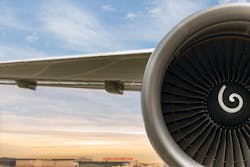Minnesota SAF Hub Coalition Formed to Scale Sustainable Aviation Fuel Production in U.S.
Bank of America, Delta Air Lines, Ecolab, and Xcel Energy have established a large-scale Minnesota sustainable aviation fuel (SAF) Hub in the U.S. to replace conventional jet fuel and decarbonize the airline industry, under the GREATER MSP Partnership.
“We’re supporting carbon reductions in the transportation sector by supplying carbon-free electricity and clean fuels like hydrogen and renewable natural gas, spurring commercial-scale SAF production in our headquarters state of Minnesota,” said Xcel Energy CEO Bob Frenzel. “This coalition also allows Xcel Energy to explore other end uses for SAF, including as a clean fuel for power generation and home heating.”
The coalition, which will scale SAF with the urgency commercial aviation needs to reach net zero by 2050, has not only established a shared, multi-phase strategy, securing nation-leading financial incentives from Minnesota but has also built a growing coalition of organizations including the State of Minnesota, the Metropolitan Airports Commission, the University of Minnesota, and McKinsey & Company.
“It was important for Ecolab to join other industry leaders on day one of the Minnesota SAF Hub, as our process innovation and technology expertise can help the coalition scale to meet the challenge and opportunity of sustainable aviation,” said Ecolab CEO Christophe Beck.
For scaling SAF production, the coalition is utilizing a multi-phased approach from promoting the flow of SAF into the state to supporting a strong and flexible production infrastructure. While the coalition is using existing technologies to speed up progress, it is also focusing on technologies with the greatest carbon reduction potential.
The coalition aims to bring commercial-scale volumes of affordable, low-carbon SAF to the Minneapolis-Saint Paul (MSP) International Airport from out of state by 2025. The group has not named a specific site for the future SAF hub.
To transform Minnesota ethanol to jet fuel, SAF production starts in Minnesota with the use of new and existing infrastructure and assets. With carbon capture and regenerative agricultural practices and crops, the coalition will reduce the carbon intensity of SAF.
The power-to-liquid pathway generates SAF from clean hydrogen and carbon to allow greater emissions reductions and fewer constraints on supply. Minnesota is well positioned to produce power-to-liquid, due to its access to affordable renewable resources and its proximity to bio-based carbon sources.
Delta, which uses around 250 million gallons annually to power its operations at MSP, expects to use SAF for more than 10% of its fuel at MSP by 2027 and aims for 50% by 2035.
“Our SAF Hub will accelerate progress toward decarbonizing the airline industry nationally while also creating thousands of good jobs across Minnesota,” said president and CEO of the GREATER MSP Partnership, Peter Frosch. “We are recruiting the next set of partners to join this effort to build an integrated SAF value chain in the center of North America’s economy.”
To stay up-to-date on the latest energy transition news, subscribe to the free EnergyTech Newsletter.
